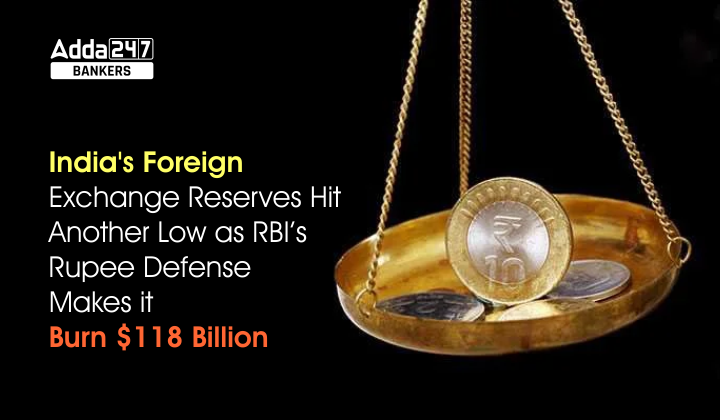Table of Contents
India’s foreign exchange reserves hit another low as RBI’s rupee defense makes it burn $118 billion: India’s foreign exchange reserves fell to a more than two-year low in the week ended October 14, as the central bank continued to defend the rupee’s decline while dismissing depleting forex reserves as a major concern. According to data released by the Reserve Bank of India, Asia’s third largest economy’s foreign exchange reserves fell by $3.85 billion to $524.52 billion for the week ending Oct. 21.
What is Foreign Exchange Reserve?
Foreign exchange reserves are assets in foreign currencies held in reserve by a central bank, such as bonds, treasury bills, and other government securities. Foreign exchange assets, gold reserves, special drawing rights, and a reserve position with the International Monetary Fund comprise India’s foreign exchange reserves (IMF). The value of non-US currencies held in foreign exchange reserves, such as the euro, pound, and yen, is reflected in foreign currency assets, which are expressed in dollar terms.
Why are Foreign Exchange Reserves declining?
According to the RBI’s Weekly Statistical Supplement, the decline in foreign exchange reserves can be attributed to a decline in Foreign Currency Assets (FCA), which is a major component of overall reserves. FCA is the effect of the appreciation or depreciation of non-US units such as the euro, pound, and yen held in foreign exchange reserves expressed in dollars. For the week ending October 21, foreign currency assets fell $3.59 billion to $465.08 billion. The value of gold reserves fell by $247 million to $37.21 billion.
What is Foreign Exchange Management Act (FEMA)?
The Foreign Exchange Regulation Act (FERA) of 1947 established the statutory authority for exchange control, which was later replaced by a more comprehensive act, the Foreign Exchange Management Act (FEMA) in 1999. FEMA came into effect on June 1, 2000. This Act empowered the Reserve Bank and, in some cases, the Central Government to control and regulate transactions involving foreign exchange payments outside India, the export and import of currency notes and bullion, the transfer of securities between residents and non-residents, the acquisition of foreign securities, and the acquisition of immovable property in and outside India, among other things.




 28th March 2025 Current Affairs | Daily ...
28th March 2025 Current Affairs | Daily ...
 27th March 2025 Current Affairs | Daily ...
27th March 2025 Current Affairs | Daily ...
 26th March 2025 Current Affairs | Daily ...
26th March 2025 Current Affairs | Daily ...







